Illinois Representatives’ Votes in Congress
Chronicle Media — October 6, 2015United States Senate
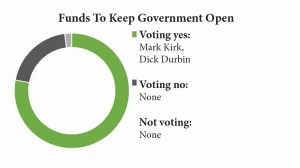 Funds To Keep Government Open: Voting 78 for and 20 against, the Senate on Sept. 30 passed an appropriations bill (HR 719) to fund the federal government over the next 10 weeks and thus avert a partial shutdown of agencies on Oct. 1, the first day of fiscal 2016. The bill, which funds discretionary programs at an annualized level of nearly $1.02 trillion, was necessary because Congress failed to enact any of the 12 regular appropriations bills for the new fiscal year. The bill was supported by all 46 members of the Democratic caucus and 32 Republicans and opposed by 20 Republicans. The two senators not voting were Lindsey Graham, R-S.C., and Marco Rubio, R-Fla.
Funds To Keep Government Open: Voting 78 for and 20 against, the Senate on Sept. 30 passed an appropriations bill (HR 719) to fund the federal government over the next 10 weeks and thus avert a partial shutdown of agencies on Oct. 1, the first day of fiscal 2016. The bill, which funds discretionary programs at an annualized level of nearly $1.02 trillion, was necessary because Congress failed to enact any of the 12 regular appropriations bills for the new fiscal year. The bill was supported by all 46 members of the Democratic caucus and 32 Republicans and opposed by 20 Republicans. The two senators not voting were Lindsey Graham, R-S.C., and Marco Rubio, R-Fla.
Richard Durbin, D-Ill., said “this brinksmanship goes far beyond flowery speeches on the floor and press attention. The last shutdown hurt the gross domestic product….We saw $2 billion in lost productivity from furloughed employees.”
Ted Cruz, R-Texas, said Republican leaders “said they will never, ever shut down the government, and suddenly President Obama understands the easy key to winning every battle: He simply has to utter the word `shutdown’ and Republican leadership runs to the hills.”
A yes vote was to send the bill to the House.
United States House of Representatives
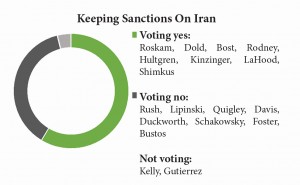 Keeping Sanctions On Iran: Voting 251 for and 173 against, the House on Oct. 1 passed a bill (HR 3457) to keep U.S. economic sanctions on Iran until it has paid outstanding court judgments arising from its involvement in acts of terrorism. This was another bid by Republicans to kill a soon-to-be-implemented six-nation deal in which Iran has agreed to dismantle its nuclear-arms program in return for a lifting of U.S. and international sanctions on its financial and energy sectors.
Keeping Sanctions On Iran: Voting 251 for and 173 against, the House on Oct. 1 passed a bill (HR 3457) to keep U.S. economic sanctions on Iran until it has paid outstanding court judgments arising from its involvement in acts of terrorism. This was another bid by Republicans to kill a soon-to-be-implemented six-nation deal in which Iran has agreed to dismantle its nuclear-arms program in return for a lifting of U.S. and international sanctions on its financial and energy sectors.
Bradley Byrne, R-Ala., said the bill presents a choice: “You either stand with the ayatollah or you stand with U.S. citizens — it’s one way or the other.”
James McGovern, D-Mass., called the bill “a political charade” that has no chance of becoming law.
A yes vote was to send the bill to the Senate, where it will be dead on arrival.
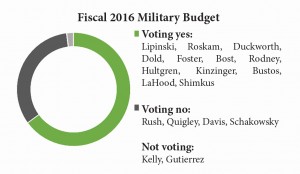 Fiscal 2016 Military Budget: Voting 270 for and 156 against, the House on Oct. 1 approved the conference report on a bill (HR 1735) authorizing a $604.2 billion military budget for fiscal 2016, including $50.9 billion in emergency spending for U.S. combat operations abroad. The bill drew a presidential veto threat over its shifting of $38 billion in routine military spending to an emergency war account in order to evade Pentagon spending caps imposed by the sequester. Democrats said they want sequester caps repealed for both domestic and military programs.
Fiscal 2016 Military Budget: Voting 270 for and 156 against, the House on Oct. 1 approved the conference report on a bill (HR 1735) authorizing a $604.2 billion military budget for fiscal 2016, including $50.9 billion in emergency spending for U.S. combat operations abroad. The bill drew a presidential veto threat over its shifting of $38 billion in routine military spending to an emergency war account in order to evade Pentagon spending caps imposed by the sequester. Democrats said they want sequester caps repealed for both domestic and military programs.
The bill authorizes more than $50 billion for active-duty and retiree healthcare; $3.8 billion for Afghan security forces; $715 million to help the Iraqi military fight Islamic State forces; $600 million to boost Syrian opposition forces; $350 million in military aid to Ukraine (including $50 million for arms) and $120 million for securing the U.S. southern border. The bill sets a 1.3 percent pay raise for uniformed personnel and begins a 401(k)-style retirement plan for active and retired service members as an alternative to the military’s defined-benefit retirement plan. In addition, the bill requires military personnel to obey the Army Field Manual’s ban on torture of prisoners.
Bradley Byrne, R-Ala., said that in light of current national-security threats, it is “simply beyond belief” that President Obama would threaten to veto the bill.
Jared Polis, D-Colo., said: “Just yesterday, 151 (House) Republicans voted to shut down the Pentagon just because they couldn’t get their way” on an unrelated bill to defund Planned Parenthood.
A yes vote was to approve the conference report, which awaits Senate action.
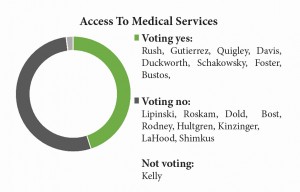 Access To Medical Services: Voting 184 for and 242 against, the House on Sept. 29 defeated a Democratic bid to blunt the impact of HR 3495 (above) by stipulating that none of its provisions could be used to prohibit women’s access to medical services.
Access To Medical Services: Voting 184 for and 242 against, the House on Sept. 29 defeated a Democratic bid to blunt the impact of HR 3495 (above) by stipulating that none of its provisions could be used to prohibit women’s access to medical services.
Kyrsten Sinema, D-Ariz., said: “This motion is straightforward and commonsense….(It) protects the health of American women.”
Joseph Pitts, R-Pa., said the underlying bill “will not harm women’s access to health care” while giving states “more tools to design a Medicaid program that fully serves low-income women and men.”
A yes vote was to adopt the motion, which, had it prevailed, would have immediately amended the bill.
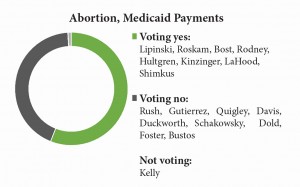 Abortion, Medicaid Payments: Voting 236 for and 193 against, the House on Sept. 29 passed a GOP-drafted bill (HR 3495} allowing states to deny Medicaid funding to Planned Parenthood and other medical providers, including doctors, in response to their abortion services. This would repeal a requirement in law that Medicaid patients be allowed to receive care from any qualified provider of their choice. Critics said the bill’s denying Medicaid reimbursements to selected doctors and clinics would take away this right of free choice. Under Roe v. Wade, abortion is legal with certain exceptions, and under the Hyde Amendment, federal funds cannot be used to pay for it. This bill is a reaction to the recent release of secretly recorded videos in which Planned Parenthood officials discuss the provision of fetal tissue to medical research.
Abortion, Medicaid Payments: Voting 236 for and 193 against, the House on Sept. 29 passed a GOP-drafted bill (HR 3495} allowing states to deny Medicaid funding to Planned Parenthood and other medical providers, including doctors, in response to their abortion services. This would repeal a requirement in law that Medicaid patients be allowed to receive care from any qualified provider of their choice. Critics said the bill’s denying Medicaid reimbursements to selected doctors and clinics would take away this right of free choice. Under Roe v. Wade, abortion is legal with certain exceptions, and under the Hyde Amendment, federal funds cannot be used to pay for it. This bill is a reaction to the recent release of secretly recorded videos in which Planned Parenthood officials discuss the provision of fetal tissue to medical research.
Joseph Pitts, R-Pa., said: “States should be able to work with providers who…respect life and exclude organizations whose business model is built around the destruction of life.”
Diana DeGette, D-Colo., called the bill “an attempt to eliminate healthcare services for women across the board, using the Planned Parenthood witch hunt as an excuse.”
A yes vote was to send the bill to the Senate, where it is expected to stall.
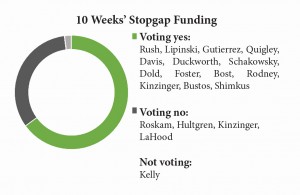 10 Weeks’ Stopgap Funding: Voting 277 for and 151 against, the House on Sept. 30 joined the Senate (below) in passing a stopgap appropriations bill (HR 719) that would fund the government through Dec. 11 at an annualized level of nearly $1.02 trillion in discretionary spending. The bill, which would cover the first 10 weeks of fiscal 2016, was supported by all 186 Democrats who voted and opposed by 151 of the 242 Republicans who voted.
10 Weeks’ Stopgap Funding: Voting 277 for and 151 against, the House on Sept. 30 joined the Senate (below) in passing a stopgap appropriations bill (HR 719) that would fund the government through Dec. 11 at an annualized level of nearly $1.02 trillion in discretionary spending. The bill, which would cover the first 10 weeks of fiscal 2016, was supported by all 186 Democrats who voted and opposed by 151 of the 242 Republicans who voted.
Harold Rogers, R-Ky, called the bill “a responsible measure that prevents a harmful government shutdown.”
No member spoke against the bill during floor debate on it.
— Illinois Representatives’ Votes in Congress —



